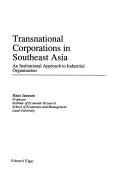New Horizons in International Business
2 total works
Transnational Corporations in Southeast Asia presents an institutional economic approach which describes and explains the local and regional organization of seventeen European transnational corporations in Southeast Asian markets in relation to their worldwide organization. Focusing on the period from 1984 to 1991, the book also includes a detailed account of the establishment strategies of these corporations and their major operations in the region. Professor Jansson utilizes a transaction-cost theory to explain behaviour within the European transnational corporations.
Providing researchers, students and business analysts with detailed information on the experience of key transnational corporations in Southeast Asia, this important book also offers an assessment of the effects of marginal activities on multinational corporations in areas far away from their home base.
THE STATE AND TRANSNATIONAL CORPORATIONS
by Hans Jansson, M Saqib, and D Deo Sharma
Using data and figures from detailed interviews with transnational corporation executives, the authors examine the strategies transnational corporations pursue towards governments, how the two interact, on what issues and at which levels, and how these contacts are developed and maintained. Through the exchange of information and favours, transnational corporations - often using local agents - are shown to be able to develop stable and trustworthy relationships with governments. The strong theoretical structure used in this study, drawing on both the network approach and institutionalist theory, emphasizes the cooperative nature of this relationship.
Researchers and students of international business, international marketing and international relations, as well as government officials and policymakers, will welcome the rigorous, empirical approach of this volume with its emphasis on the cooperative nature of state-corporate relations.

